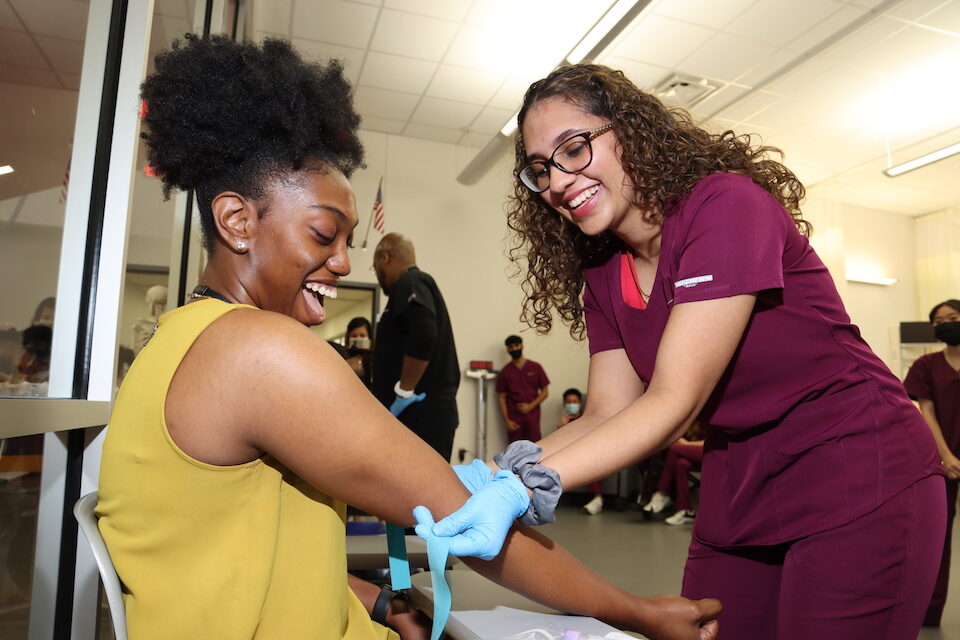
Summer camp looks a bit different for students at the Arlington ISD Dan Dipert Career and Technical Center this year. Instead of board games and enrichment, phlebotomy students are getting a crash course instructed by health science teachers Mark Ingram and Jacqulyn Robinius. Phlebotomy, also called venipuncture, is the process of using a needle to take blood from a vein, usually in the arm.
The class is normally taught during the school year, but due to curriculum changes caused by the COVID-19 pandemic, a seven-week crash course was birthed to accommodate students.
Students normally take phlebotomy in the fall and electrocardiogram (EKG) in the spring in hopes of becoming certified in both subjects by the National Healthcare Association. Along with the coursework, which is mainly completed online, students must have 36 successful arm sticks and 10 capillary (finger) sticks at the CTC.
Nearly 120 students from Arlington ISD high schools began the course in May and are headed into the final week of classes and testing. Many of them began taking classes at the CTC for different reasons, but they’re all focused on one thing: making every patient feel safe and valued.
“As a child, I suffered from a medical condition that made it hard for me to survive, but I’m here because of the care I received,” said Megan Joseph, a senior at Martin. “Depending on the circumstance, I know it’s not easy for people to get through illnesses. I push myself to understand and perfect the material now so I can help those people. I want them to know they have the best of the best doctors helping them.”
A total of six tests must be passed to be recommended for the certification test. For weeks, students have practiced on pads and artificial arms in preparation to stick patients at the clinic. Each student practices on approximately three people per day, and the clinic has seen up to 280 outpatients come in and volunteer to get stuck by a student. Following each appointment, outpatients are asked to fill out an anonymous survey to help students improve technical and personal skills.
If you thought students’ responsibilities ended at sticking people, think again. Every morning, each student is assigned a role for the day such as clinical or dietician/hydration director and more. The roles are designed to allow students to get a feel for duties they would take on when working in the healthcare industry.
“Starting the health science track and completing this course at the CTC has solidified that I want to go into the medical field after I graduate,” said Abby Pham, a senior at Martin.
Students enrolled in the course are getting a one-of-a-kind educational experience and learning leadership skills that will help them in every setting in the future.
“Instead of waiting for them to go off to college and hoping they become leaders in the future, we’re creating leaders right now,” said Ingram, a longtime nurse of 32 years. “They have the desire to want to learn, understand and perform, and they’re not afraid of failing to learn.
“Watching them morph into leaders before they even get into the medical field and seeing their compassion for other people that don’t look like them, talk like them, or live in the same neighborhood has been the most rewarding part of this clinic.”
Some graduates even received jobs at hospitals and clinics while in college and were able to administer shots, test glucose levels and perform other duties because of the experience gained at the CTC. It’s no surprise that Arlington ISD students are ahead of the game.
If your student would like to get an early start in the health science industry, please visit aisd.net for course descriptions, requirements and locations. If this program is an area of interest for you and you are not currently a student in Arlington ISD, don’t worry. You can transfer to Arlington ISD starting July 7 to join in on all the fun and career education.
